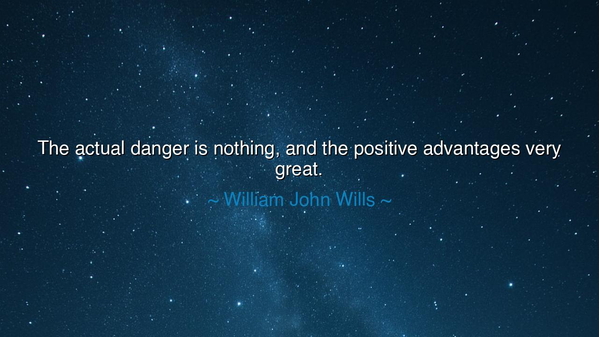
The actual danger is nothing, and the positive advantages very






William John Wills, the explorer who braved the vast and merciless lands of Australia, once spoke with the quiet certainty of a man resolved to face fate: “The actual danger is nothing, and the positive advantages very great.” These words, though simple in form, carry the weight of courage. They are the utterance of one who has weighed the terrors of the unknown and found them but shadows, while the fruits of daring shine like treasure. To him, fear was a mirage, but the rewards of action were real.
This teaching is as old as time. The ancients knew that danger often looms greater in the mind than in the field. The heart trembles before imagined storms, yet when the storm arrives, its thunder is less than the fear it conjured. Wills, who perished in the heroic but tragic Burke and Wills expedition, spoke not as one ignorant of peril, but as one who understood that to advance the boundaries of knowledge and spirit, one must hold danger lightly, like smoke in the hand. His words endure because they remind us that timidity robs us of victory more surely than risk.
Recall the voyage of Christopher Columbus, who sailed into seas that men feared led to endless falls or monstrous beings. To many, the unknown was certain death; to him, the promise of discovery outweighed the phantom of peril. And so, by holding to the belief that the “actual danger is nothing,” he gained “positive advantages very great”—a new world revealed, and history forever altered. His boldness illustrates the very spirit Wills sought to impart: that destiny smiles not upon the hesitant, but upon those who step forward despite trembling hearts.
Yet this wisdom is not for explorers alone. In the battles of daily life—whether to speak truth, to begin anew, to love without guarantee—fear whispers of ruin. But often, when the leap is taken, we find the fall was an illusion, and the ground beneath us stronger than we dreamed. Thus, Wills’ words call not merely to adventurers in deserts or seas, but to all who wrestle with the unseen terrors of choice. Fear magnifies danger; courage diminishes it.
Let this truth be carried forward: when faced with the unknown, remember Wills’ creed. The peril is often but dust on the horizon, while the gain may be vast as the sky. Do not let the whisper of danger hold you captive, for the world belongs to those who dare. And when fear rises like a giant, remind yourself that its substance is nothing, while the rewards of boldness are everything. Thus the spirit of Wills, though his body fell, endures as a beacon for every soul who longs to conquer the unseen.






M921. Nguyen Pham Thao My 9/1
William John Wills’ quote makes me think about how we approach fear and opportunity. Is it natural for humans to focus on danger, even when the rewards are much greater? How can we learn to assess risks more rationally and make decisions based on the benefits rather than being driven by irrational fear? What would it take to make risk-taking feel more rewarding?
Lleev
This quote resonates with the idea of facing challenges with a positive mindset. If the danger is truly minimal, why do we often make it seem bigger than it is? How can we train ourselves to recognize the true risks and focus on the potential gains? Are we conditioned to avoid risks, or do we simply not see how much we stand to gain?
TQPhan Tu Quynh
I’m intrigued by this idea that the actual danger is insignificant, yet the positive advantages are substantial. Does this mean that risk should be approached with more confidence and optimism? Is it possible to minimize the perception of danger in our daily lives and focus more on the long-term benefits of taking chances or making bold moves?
LANgo Thi Lan Anh
William John Wills seems to suggest that danger is often exaggerated, while the potential benefits are far greater. How often do we let fear of danger hold us back from pursuing opportunities? Is it possible that, in many situations, we overestimate the risks involved and underestimate the rewards? How do we change our mindset to focus more on the positive outcomes rather than the perceived dangers?